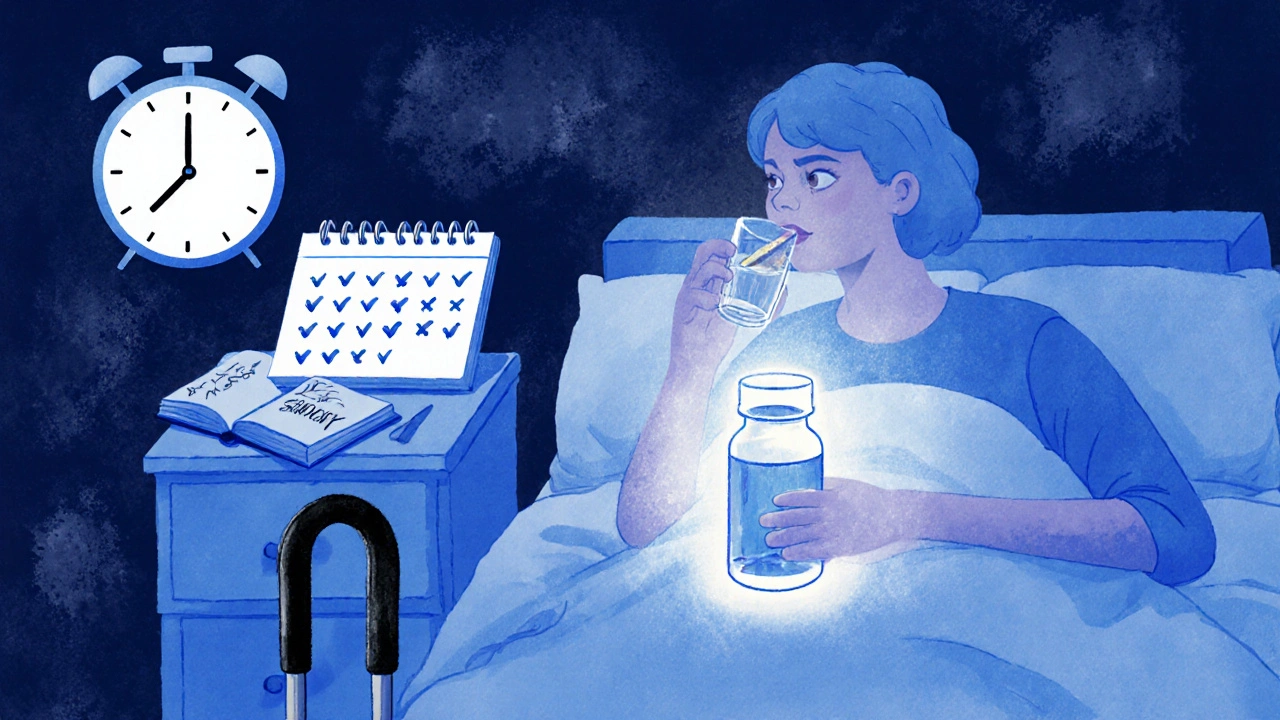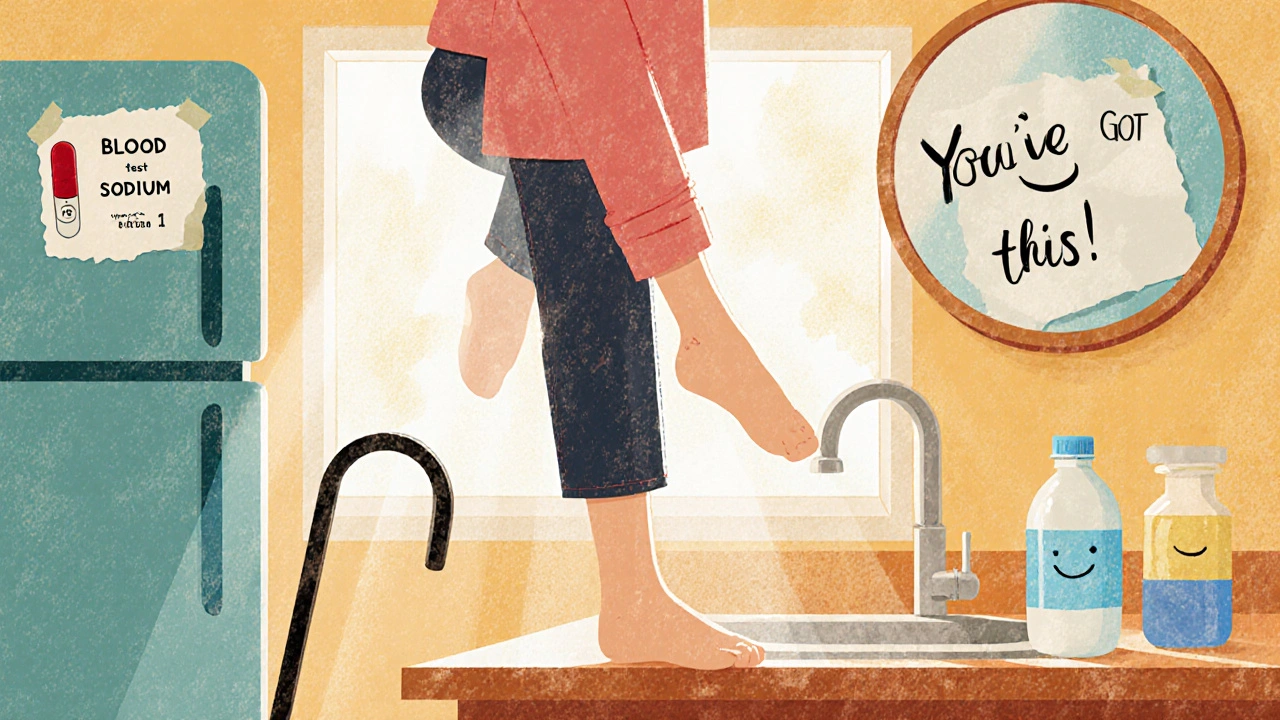If you’re taking oxcarbazepine for epilepsy or nerve pain, and you’ve started feeling dizzy, you’re not alone. About 1 in 3 people on this medication report dizziness, especially when they first start or when the dose goes up. It’s not dangerous for most, but it can make you feel unsteady, tired, or even nauseous-enough to mess with your daily life. The good news? There are real, practical ways to manage it without stopping the medicine.
Why Does Oxcarbazepine Make You Dizzy?
Oxcarbazepine works by calming overactive nerves in the brain, which helps stop seizures and reduce pain signals. But that same calming effect can slow down signals in other parts of your nervous system-including those that control balance and coordination. This is why dizziness happens. It’s not a sign the drug isn’t working; it’s a side effect of how it works.
Some people notice it right away. Others don’t feel it until they’ve been on the drug for weeks. It’s often worse when you stand up too fast, after a long day, or if you’re dehydrated. Alcohol, other medications like sleep aids or antidepressants, and even skipping meals can make it worse.
When to Worry About the Dizziness
Most dizziness from oxcarbazepine is mild and fades after a few weeks. But if you’re experiencing any of these, talk to your doctor right away:
- Loss of balance so bad you’re falling
- Blurred or double vision
- Slurred speech or confusion
- Severe nausea or vomiting
- Swelling in your face, lips, or tongue
These could signal something more serious, like low sodium levels (hyponatremia), which oxcarbazepine can cause. A simple blood test can check this. If your sodium is low, your doctor might adjust your dose or suggest changes to how much water you drink.
How to Reduce Dizziness Right Now
You don’t have to just live with it. Here’s what actually helps, based on patient reports and clinical guidance:
- Stand up slowly. Give your body time to adjust. Pause for three seconds after sitting up before standing. Wait another three seconds before walking. This simple habit cuts dizziness by half for many people.
- Stay hydrated. Drink water throughout the day-not just when you’re thirsty. Aim for 6-8 glasses. Avoid drinking too much at once. Sipping keeps your fluid levels steady.
- Avoid alcohol. Even one drink can double the dizziness. It’s not worth the risk.
- Don’t drive or operate heavy machinery until you know how you react. If you feel wobbly after your morning dose, wait until after lunch to test how steady you are.
- Eat regular, balanced meals. Low blood sugar makes dizziness worse. Keep snacks like nuts, fruit, or yogurt on hand.

Timing Your Dose for Less Dizziness
Many people find that taking oxcarbazepine at night reduces daytime dizziness. If you’re on one dose a day, try taking it right before bed. If you’re on two doses, take the larger one at night and the smaller one in the morning. This lets the peak effect happen while you’re sleeping.
Some patients report feeling better after switching from morning to evening dosing-even if they didn’t change the amount. Talk to your doctor about adjusting timing before changing the dose.
What If Dizziness Doesn’t Go Away?
If you’ve been on oxcarbazepine for more than 6 weeks and dizziness is still a problem, your doctor might consider a few options:
- Lower the dose slightly. Sometimes a smaller dose still controls seizures but causes less dizziness.
- Switch to another medication. Drugs like lamotrigine or levetiracetam have lower rates of dizziness and may be just as effective.
- Add a support medication. In rare cases, a low dose of a drug like acetazolamide can help with balance issues.
Never stop oxcarbazepine on your own. Stopping suddenly can trigger seizures or worsen nerve pain. Always work with your doctor to adjust safely.

Real-Life Tips from People Taking It
People who’ve managed this side effect for months or years share what worked:
- “I started using a cane indoors. It gave me confidence when walking, even if I just felt a little off.”
- “I kept a journal. I wrote down when I felt dizzy-after coffee? After skipping lunch? Turns out, caffeine made it worse.”
- “I did balance exercises for 10 minutes a day. Standing on one foot, holding onto the sink. After two weeks, I noticed I wasn’t stumbling as much.”
- “I switched to a lower-sodium diet. My doctor said my sodium was borderline low, and cutting back on processed foods helped.”
What to Ask Your Doctor
Next time you see your doctor, bring up these questions:
- “Is my dizziness likely caused by oxcarbazepine, or could something else be going on?”
- “Could my sodium levels be low? Can we check a blood test?”
- “Would switching the time I take my dose help?”
- “Are there other seizure meds with fewer balance side effects?”
- “Should I avoid any other medicines or supplements while on this?”
Doctors see this often. Don’t feel like you’re bothering them. Your comfort matters as much as controlling seizures.
Final Thought: This Isn’t Permanent
Most people find that dizziness fades after 4 to 8 weeks. Your body adapts. The nerves that control balance learn to work around the medication’s effect. For many, it becomes barely noticeable.
But if it doesn’t, you have options. You don’t have to accept dizziness as a life sentence just because you’re on oxcarbazepine. With small changes in timing, habits, and communication with your care team, you can get your balance-and your life-back.
Can oxcarbazepine cause long-term dizziness?
Long-term dizziness from oxcarbazepine is uncommon. Most people see improvement within 4 to 8 weeks as their body adjusts. If dizziness persists beyond 2 months, it’s likely due to another factor-like low sodium, another medication, or an underlying condition. Talk to your doctor about blood tests and possible alternatives.
Does drinking more water help with oxcarbazepine dizziness?
Yes, but only if you’re dehydrated. Oxcarbazepine can cause your body to lose sodium, and low sodium can lead to dizziness. Drinking water helps, but drinking too much without enough sodium can make things worse. Stick to 6-8 glasses a day, and avoid drinking large amounts all at once. If you’re unsure, ask your doctor about checking your sodium levels.
Can I take over-the-counter motion sickness meds for oxcarbazepine dizziness?
Avoid over-the-counter motion sickness drugs like meclizine or dimenhydrinate unless your doctor says it’s safe. These can add to the sedative effect of oxcarbazepine, making you even more tired or confused. They don’t fix the root cause and can mask symptoms that need medical attention.
Will switching to a different seizure medication help with dizziness?
Yes, some alternatives have lower rates of dizziness. Lamotrigine and levetiracetam are often better tolerated for balance issues. But switching isn’t automatic-your doctor will consider your seizure type, history, and other health factors. Don’t switch on your own. Work with your neurologist to find the right balance between control and side effects.
Is it safe to drive if I feel dizzy on oxcarbazepine?
No, not until you know how you react. Even mild dizziness can slow your reaction time and affect your judgment. In the UK, you must inform the DVLA if your condition or medication affects your ability to drive safely. Your doctor can advise you on when it’s safe to get behind the wheel again.




Billy Tiger, October 31, 2025
Who the hell cares about dizziness when you’re not having seizures? This is why America’s gone soft. You take the medicine, you deal with it. No one wants to suffer anymore but we used to just grin and bear it. My grandpa took phenobarbital and still fixed his truck at 70
Katie Ring, November 1, 2025
It’s not about toughness, it’s about neuroplasticity. The brain isn’t broken-it’s adapting. Dizziness isn’t a side effect, it’s a signal. Your nervous system is recalibrating to a new equilibrium. You’re not sick, you’re evolving. Stop pathologizing normal biological adjustment
Adarsha Foundation, November 1, 2025
I’ve been on oxcarbazepine for 3 years now. Dizziness was bad at first, but slowly I learned to move with it. I started walking barefoot on grass every morning. Not because it’s magic-but because it grounded me. Literally and figuratively. Small things help. No need to rush. Your body knows what to do if you let it
Alex Sherman, November 2, 2025
Of course you’re dizzy. You’re taking a drug developed by pharmaceutical conglomerates that don’t give a damn about your balance. They care about profit margins. The real solution? Stop taking it. But of course, you’ll be told to ‘just adjust’ because the system doesn’t want you to ask harder questions
Oliver Myers, November 3, 2025
Hey, I just wanted to say-this is such a helpful, thoughtful post! Seriously, thank you for sharing the practical tips! I’ve been on oxcarbazepine for 10 months, and standing up slowly? Game-changer. Also, the journaling idea? I started that last week, and wow-I didn’t realize coffee made it worse. I’m so glad I found this. You’re not alone. You’re doing great. Keep going!!
John Concepcion, November 5, 2025
Lmao so you’re telling me I can’t have a beer and not feel like I’m on a rocking boat? Newsflash: the drug makes you dizzy, not your lifestyle. If you can’t handle a little wobble, maybe you shouldn’t be on it. Also, who writes ‘6-8 glasses’ like it’s a yoga manual? Grow up
Caitlin Stewart, November 6, 2025
I’ve been there. The first month was brutal. I’d walk into walls. But I started doing tai chi videos on YouTube-just 10 minutes a day. Not because I wanted to be zen, but because I needed to feel my feet again. It didn’t fix everything, but it gave me back a little control. You’re not broken. You’re just learning a new rhythm
Emmalee Amthor, November 7, 2025
so i started taking oxcarbazepine and i was dizzy all the time and i thought i was going crazy but then i reaized its just my body adjusting and now i feel so much better like i dont even notice it anymore and i just wanna say to anyone who is struggling you got this!!
Leslie Schnack, November 8, 2025
Has anyone tried magnesium supplements? My neurologist mentioned it might help with nerve stability. I started 400mg daily and noticed less morning dizziness. Not a cure, but it felt like a small edge. Wondering if others have experimented with electrolytes or B-vitamins?
Saumyata Tiwari, November 9, 2025
How quaint. In India, we don’t have the luxury of writing blog posts about dizziness. We take the medicine, work 14 hours, and still make chai for our families. Dizziness is a privilege of those who can afford to sit and analyze their balance. Try living with a 30-minute commute on a crowded train and then tell me about your ‘adjustment period’
Anthony Tong, November 10, 2025
Let’s not ignore the elephant in the room: oxcarbazepine is a derivative of carbamazepine, which was pulled in Europe for causing aplastic anemia. The FDA allows it because of lobbying. Dizziness is the least of your concerns. Check your CBC. Check your liver enzymes. You’re being slowly poisoned and told to sip water. Wake up.
Roy Scorer, November 12, 2025
You think dizziness is the real problem? No. The real problem is that you’ve surrendered your autonomy to a pill. You’ve outsourced your healing to a chemical. You’re not managing side effects-you’re avoiding the deeper question: Why are you dependent on this in the first place? What trauma, what disconnection, what unprocessed pain led you here? The dizziness is just the body screaming for attention
Marcia Facundo, November 12, 2025
My sister took this for 5 years. She stopped cold turkey because she couldn’t stand the dizziness. Seizures came back worse. She’s in a wheelchair now. I just wanted to say: don’t quit. Don’t listen to the people who make you feel guilty for needing help. You’re not weak for needing medicine.
Ajay Kumar, November 13, 2025
Everyone’s talking about hydration and timing and balance exercises but nobody’s talking about the fact that oxcarbazepine is metabolized by the liver and if you’re a night owl who eats pizza at 2am and sleeps at 5am, you’re basically sabotaging your own pharmacokinetics. Your circadian rhythm is trash. Your cortisol is all over the place. You think dizziness is from the drug? No. It’s from your lifestyle. Fix your sleep schedule before you blame the medicine. And stop drinking kombucha like it’s a miracle cure-it’s just fermented sugar with pretentious branding
Joseph Kiser, November 14, 2025
You’re not alone 💪 I felt like I was gonna fall over every time I stood up. Then I started doing heel-to-toe walks by the fridge every morning. It’s dumb. It’s boring. But after 3 weeks? I didn’t even think about it anymore. And yeah, I take it at night now. Best decision ever. You’re gonna be okay. I believe in you 🌱